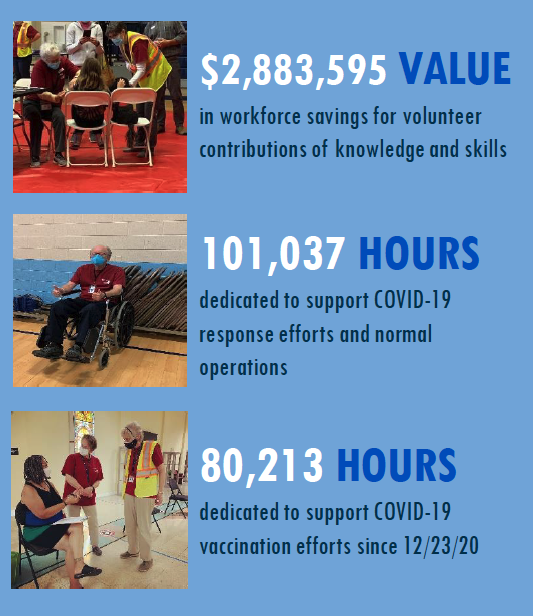About the Medical Reserve Corps
MRC volunteers include medical and public health professionals, as well as other community members without healthcare backgrounds. MRC units engage these volunteers to strengthen public health, improve emergency response capabilities, and build community resiliency. They prepare for and respond to natural disasters, such as wildfires, hurricanes, tornados, blizzards, and floods, as well as other emergencies affecting public health, such as disease outbreaks. They frequently contribute to community health activities that promote healthy habits.

[Download the Jan 2022 MRC Impact Report]
CONTACT
For additional information and training locations, please contact Alyssa Lewis at 804-501-4532 or by email at alyssa.lewis@vdh.virginia.gov.
NEWS
The Greater Richmond MRC was recently featured in a nationally syndicated article by Scripps Media.
Who can volunteer with the MRC Program?
Everyone is encouraged to join the Greater Richmond MRC. The MRC is recruiting both medical and non-medical volunteers. We need people with a variety of skills.
- MRC volunteers include practicing and retired medical and public health professionals such as physicians, nurses, pharmacists, students, mental health workers, home health care workers and others.
- MRC volunteers also include concerned local citizens with or without medical expertise who are interested in being trained to assist themselves and the community during an emergency.
REGISTRATION
How do I register?
To become a Virginia Medical Reserve Corps volunteer you must first register in the Virginia Volunteer Health System (VVHS).
The VVHS is a web-based information, alerting, and credentialing system for the management of medical and support volunteers who desire to support public health emergencies and daily public health activities in Virginia.
What will I do in an emergency?
- Perform duties and functions as required by the Health Department to respond to or mitigate disasters
- Dispense medications and vaccines in the community
- Staff emergency shelters or alternate-care sites
- Staff emergency center hotlines
- Assist with administrative and other essential support functions
- Conduct assignments based on your background and training
What training will I receive?
MRC volunteers are offered orientations to the MRC and can receive training in emergency management, Personal & Family Preparedness, Bioterrorism Awareness, First AID, Pandemic Influenza, Points of Dispensing, and they can participate in RCHD emergency training exercises.
DID YOU KNOW?
- Health screenings
- Vaccination clinics
- Outreach to underserved community members
- First aid during large public gatherings
- Community event support
- Health education and promotion
- Opioid and naloxone education
The RCHD Emergency Preparedness Program develops plans and coordinates activities to ensure that the Richmond City Health District is prepared to respond rapidly and effectively to public health emergencies. Our emergency preparedness coordinator works closely with city, state, and federal emergency planners to plan and implement responses to threats such as disease outbreaks or natural disasters. This includes a Pandemic Influenza Response Plan that provides training for RCHD personnel and volunteers to develop capacity for dispensing mass prophylaxis at city-wide and regional levels.
EMERGENCY
PREPAREDNESS
CONTACT
(804) 205-3753
